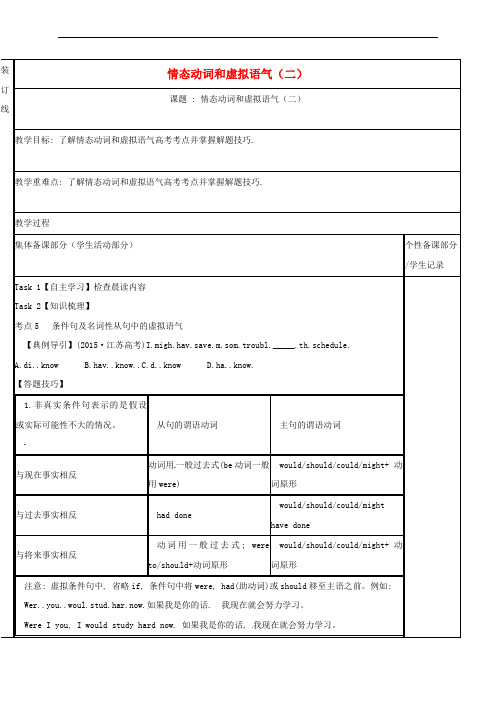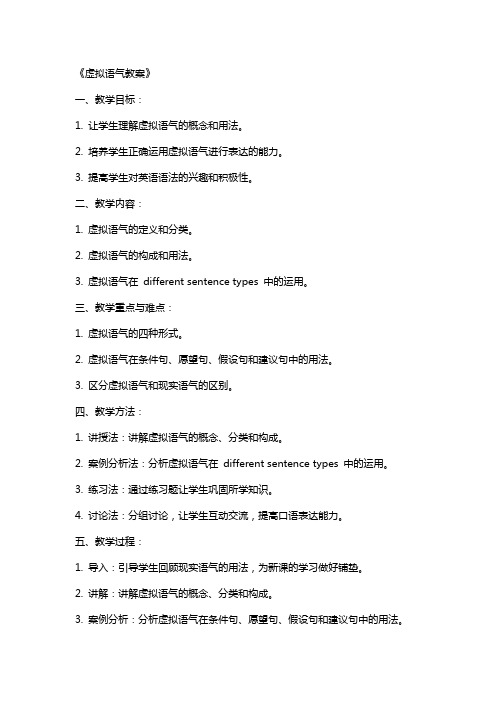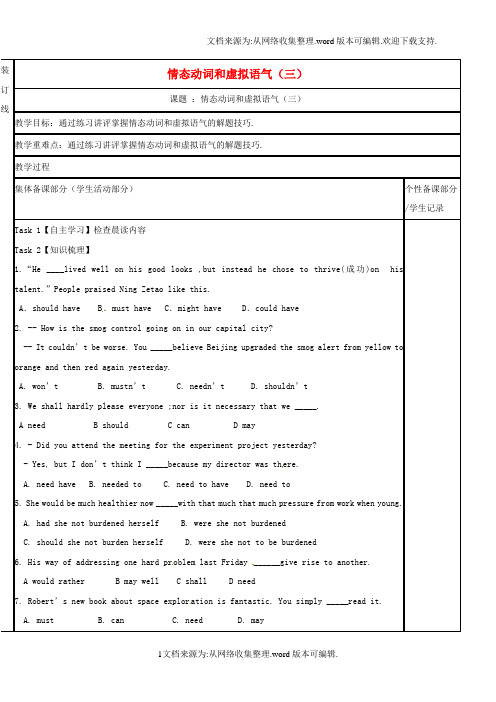2020高考英语大二轮复习专题三关注点课时第2讲情态动词和虚拟语气教学案
20xx届高考英语情态动词和虚拟语气第二轮备考复习教案

20xx届高考英语情态动词和虚拟语气第二轮备考复习教案卫辉一中XX届高三二轮备考抓分点透析之英语情态动词和虚拟语气【XX年高考命题预测】作为历年高考必考语法点情态动词依旧会是XX年高考的热点。
同学们首先应该着重掌握情态动词的基本用法,同时结合情态动词的用法学习虚拟语气。
【概述】情态动词也叫语气动词,有一定的词义,但本身不表示行为或状态,而只是表示说话人对所说动作的看法,认为它“可能”、“应当”、“必要”等。
情态动词不能单独作谓语动词,只能和动词原形一起构成谓语动词。
英语里的情态动词主要有:can(could), may(might), must, shall, will, would, need, dare, should, ought to。
情态动词在任何主语后没有人称和数的变化。
除must, need, ought to外,其他情态动词有表示过去时的形式变化:现在式过去式cancouldmaymightshallshouldwill woulddare dared【重难点突破】一、情态动词⒈can 和could⑴表示能力can 表示现在或未来的能力,could作为can的过去式,表示过去的“能力”whales cannot live on land.鲸不能生活在陆地上。
before liberation few workers could support their families.解放前几乎没有工人能养得起家。
* be able to 与can、could的异同:◆be able to 可用于多种时态,can和could只用于现在时和过去时。
he will be able to go wi th us this afternoon.他今天下午能和我们一起去。
(一般将来时)i haven’t been able to see the difference yet.我还不能看出区别在哪。
(现在完成时)he thought i would be able to do the work well.他认为我能把这项工作做好。
高三英语二轮复习-语法专项七-情态动词和虚拟语气(二)教学案

装订线情态动词和虚拟语气(二)课题 : 情态动词和虚拟语气(二)教学目标: 了解情态动词和虚拟语气高考考点并掌握解题技巧.教学重难点: 了解情态动词和虚拟语气高考考点并掌握解题技巧.教学过程集体备课部分(学生活动部分)个性备课部分/学生记录1.非真实条件句表示的是假设或实际可能性不大的情况。
从句的谓语动词主句的谓语动词与现在事实相反动词用一般过去式(be动词一般用were)would/should/could/might+动词原形与过去事实相反had donewould/should/could/mighthave done与将来事实相反动词用一般过去式; wereto/shou ld+动词原形would/should/could/might+动词原形集体备课部分(学生活动部分)个性备课部分/学生记录装订线【答题技巧】1.虚拟条件句中.如果主句和条件从句的谓语动作不是同时发生时.虚拟语气的形式应作相应的调整。
这种条件句叫错综条件句。
(1)从句的动作与过去事实相反, 而主句的动作与正在发生的事实相反。
.her.now.(2)从句的动作与现在事实相反, 而主句的动作与过去事实相反。
I..wer.you.I.wouldn’s.night.2.非真实条件句中的条件有时不表达出来.只暗含在副词、介词短语、上下文或用其他方式表示出来.这种句子叫含蓄条件句。
在多数情况下.条件会暗含在短语中.如without....bu.for...(要不是因为……).or.otherwise.but等。
3.woul.rather所接的从句中的谓语动词用一般过去时(对现在虚拟)或者过去完成时(对过去虚拟)。
4.I.is(high)time(that)...句型中谓语动词用一般过去时或should+动词原形.should不可省略。
5.i.only后面的谓语动词常用一般过去时(对现在虚拟)、过去完成时(对过去虚拟)与过去将来时(对将来虚拟).表示强烈的愿望。
《虚拟语气教案》

《虚拟语气教案》一、教学目标:1. 让学生理解虚拟语气的概念和用法。
2. 培养学生正确运用虚拟语气进行表达的能力。
3. 提高学生对英语语法的兴趣和积极性。
二、教学内容:1. 虚拟语气的定义和分类。
2. 虚拟语气的构成和用法。
3. 虚拟语气在different sentence types 中的运用。
三、教学重点与难点:1. 虚拟语气的四种形式。
2. 虚拟语气在条件句、愿望句、假设句和建议句中的用法。
3. 区分虚拟语气和现实语气的区别。
四、教学方法:1. 讲授法:讲解虚拟语气的概念、分类和构成。
2. 案例分析法:分析虚拟语气在different sentence types 中的运用。
3. 练习法:通过练习题让学生巩固所学知识。
4. 讨论法:分组讨论,让学生互动交流,提高口语表达能力。
五、教学过程:1. 导入:引导学生回顾现实语气的用法,为新课的学习做好铺垫。
2. 讲解:讲解虚拟语气的概念、分类和构成。
3. 案例分析:分析虚拟语气在条件句、愿望句、假设句和建议句中的用法。
4. 练习:布置练习题,让学生巩固所学知识。
5. 讨论:分组讨论,让学生互动交流,提高口语表达能力。
7. 作业布置:布置课后作业,巩固所学知识。
六、教学评价:1. 课后作业:评估学生对虚拟语气的理解和运用能力。
2. 课堂练习:观察学生在练习中的表现,及时发现问题并进行针对性的辅导。
3. 小组讨论:评价学生在讨论中的参与程度和口语表达能力。
4. 考试:设置有关虚拟语气的试题,检验学生对知识的掌握程度。
七、教学资源:1. 教材:选用合适的英语教材,如《新概念英语》、《大学英语》等。
2. 教案:根据教材内容编写详细的教学计划。
3. 课件:制作课件,辅助讲解和展示虚拟语气的用法。
4. 练习题:编写练习题,巩固学生对虚拟语气的掌握。
八、教学进度安排:1. 第一课时:介绍虚拟语气的概念和分类。
2. 第二课时:讲解虚拟语气的构成和用法。
3. 第三课时:分析虚拟语气在条件句、愿望句、假设句和建议句中的用法。
20xx高考二轮复习英语教案-情态动词和虚拟语气

20xx高考二轮复习英语教案:情态动词和虚拟语气XX高考二轮复习英语教案: 情态动词和虚拟语气【专题要点】情态动词和虚拟语气要点概览如下:1.can和could的用法及区别;2.may和might的用法;3.must的用法;4.shall用于不同人称时的用法;5.should表示推测时的用法;6.will和would表示意愿、习惯和倾向性时的用法;7.“情态动词+have done”的用法;8.表示建议、命令、要求的动词后的宾语从句中用虚拟语气的用法;9.一些固定句式或结构中虚拟语气的用法;10.一些隐含、混合情况的虚拟语气。
【考纲要求】对于情态动词考纲要求学生要掌握情态动词的基本用法和辨析。
最近几年高考试题中常常借助语境来考查情态动词的基本用法及其区别,因此在平时学习时准确理解和掌握情态动词的基本用法十分重要。
情态动词的用法复杂多变,在高考试题中,命题者常常利用语境和句子之间意义上的细微差别来考查学生对情态动词的理解和掌握。
对于情态动词,除了要求考生能够准确掌握它们的基本用法外,还要充分利用高考试题所设置的语境来分析句子之间所体现的特殊关系。
对于虚拟语气考纲要求考生要掌握基本情态动词的用法、在各种句式、隐含、混合等句中的虚拟语气用法,根据考纲的要求,虚拟语气部分主要考查情态动词的选择、虚拟语气在条件句中、在名词性从句中、在简单句中或在日常交际中的使用等基本用法。
因此依据语境来判断虚拟语气的不同形式是高考试题的主要设题方法之一。
在近年的高考试题中,出现了对陈述语气与虚拟语气辨析的考查,虚拟语气在各种从句中的应用是该部分的重点掌握内容。
【教法指引】情态动词是高考的重要考点,看似简单,但用法相近、复杂,学生学起来有时区分不开。
首先教师应该让考生准确掌握每个情态动词的用法,然后对于相近意义的情态动词进行比较,尤其是表示推测的一些情态动词以及在虚拟语气中运用,让学生在辨析中学,在训练中体验、理解、掌握,要注重和语境结合和说话者的语气结合;其次再掌握情态动词的固定句式和固定用法即可;虚拟语气是高考考查的重点语法项目,虽然不是每套题都涉及,但在近几年的考题中也有不少出现。
高中英语语法--《情态动词与虚拟语气》教学案

一、情态动词的语法特征(1)情态动词不能表示正在发生或已经发生的事情,只表示期待或估计某事的发生。
(2)情态动词除ought 和have 外,后面只能接不带to 的不定式。
(3)情态动词没有人称,数的变化。
(4)情态动词没有非谓语形式,即没有不定式、分词、动名词等形式。
二、虚拟语气用来表示说话人的主观愿望或假想,所说的是一个条件,多半不是事实,或与事实相反。
高考重点要求:1、情态动词的基本用法2、情态动词表示推测的语义差别3、情态动词后接不定式完成体的不同意义4、虚拟语气中情态动词的用法情态动词(一) 情态动词在一般时否定句中的用法can't(cannot) 表示“不可能”,may not 表示“不可以”“可能不”,mustn't(must not) 表示“一定不要”,“不许可”,needn't (need not) 表示“不必”,dare not +动词原形表示“不敢”。
He can't know the news.He may not sleep now.You mustn't criticize her in that way.You needn't come tomorrow.He dared not meet his parents.(二)can,may,must三者用法比较can,may,must是三个最重要的情态动词1. can,may,must的肯定句You may eat lunch,but you must wash your hands. 你可以吃饭,但是你必须洗手。
(1)can表示能力;能,会She can run fast,but I can't. 她很会跑,但是我不会。
表示可能;能够I can get there in ten minutes. 我十分钟之后就可以到那儿。
(表示一种可能性)表示允许;许可You can use this dictionary. 你可以用这本字典。
高三英语二轮复习语法专项七情态动词和虚拟语气三教学案

装订线情态动词和虚拟语气(三)课题:情态动词和虚拟语气(三)教学目标:通过练习讲评掌握情态动词和虚拟语气的解题技巧.教学重难点:通过练习讲评掌握情态动词和虚拟语气的解题技巧.教学过程集体备课部分(学生活动部分)个性备课部分/学生记录A.should have B.must have C.might have D.could have- Yes, but I don’t think I _____because my director was th ere.6. His way of addressing one hard pr oblem last Friday ______give rise to another.7. Robert’s new book about space explor ation is fantastic. You simply _____read it.8.You are w elcome to use this area for your baby buggy(童车).However,_____ a wheelchair user board the bus ,you are not supposed to use this special area.A.would B.might C.should D.could9. -- Do you still remember when we went to Australia?--I can’t remember now but ______sometime last win ter?A.might it be B.could it beC.could it have been D.should it have been10. We can gain valuable wisdom from mistakes which _____to prevent them from happening again.A.should be avoided B.might be avoidedC.might have been avoided D.would have been avoided11. (2017无锡,33) If I ___ preparations for my experiment this afternoon, I ____ to see the film last night.A. were not to make, would have goneB. had not made, would goC. were not making, would have goneD. did not make, would go12. (2016浙江15) Had the government and scientists not worked together, AIDD-related deaths ____ since集体备课部分(学生活动部分)个性备课部分/学生记录装订线their highes t in 2005.A.had not fallen B.would not fallC.did not fall D.would not have fallen13. -- It was such a difficult examination that a lot of students were unable to finish it on time.-- That’s the case. It is hard to accept the fact that over 90% of my classmates _____.A should failB should have failedC will failD may fail14. Turn off the TV, Jack. ____ your homework now?A. should you be doingB. shouldn’t you be doingC. couldn’t you be doingD. will you be doing15. -- Will it take me long to get to the Sunshine Hotel?–No, it ____ take you long. It’s not the rush hour now.A. shouldn’tB. shan’tC. mustn’tD. needn’t16. -- Tom is often late for work, Bob.– Tell him he ___ answer for it if he continues.A. ShallB. willC. shouldD. could17. Since there is abundant food in the sea, it is understandable that some of the creatures that evolved on land ____ to the sea.A would have returnedB could have returnedC might have returnedD should have returned18. According to the new rules, if a student ___ happen to damage something in the campus, he or she ___ report it to those concerned immediately.A can; willB shall, shouldC will, shallD should, shall19. Part of the highway would be temporarily closed ___ the heavy fog to co ntinue.A. shouldB. hadC. wereD. could20. If our children ___ live to see the next century, what change will they see?A. wouldB. couldC. shouldD. might21. – I ___ imagine it will take about two hours to have your pictures developed.-- All right. I will come to get them by then.A. wouldB. canC. mustD. should22. – I ordered Pizza for dinner. It ___ be here any m inute now.-- Pizza again? We __ pizza every night for a week now!A should, have been havingB may, were havingC can, hadD must, will be having当堂检测:完成“随堂检测”课后作业:。
最新【二轮精品】届高三英语二轮复习精品教学案:【专题七】情态动词与虚拟语气

【专题七】情态动词与虚拟语气【考情分析】1.准确把握情态动词表允许、推测、判断等用法。
2.准确把握情态动词在虚拟语气句子结构中的使用。
3.wish,as if/though,if only,would rather+从句,It’s time+从句等句型中的虚拟语气。
4.表示“坚持、命令、建议、要求”的词语后及各类从句中的虚拟语气。
5.虚拟语气在条件状语从句中的倒装。
【知识归纳】情态动词考点一情态动词的基本用法1.can 和could的用法(1)表示惊讶,常用在否定句和疑问句中。
How could you do such a silly thing?你怎么能做那样的蠢事呢?(2)cannot...too/enough表示“无论……也不过分”;“越……越好”。
You can’t be too careful while driving.开车时越小心越好。
2.may和might的用法(1)may和might表示“许可”,“可能性”,“祝愿”等意义。
①在给予别人许可时,常用can,但有时也用may。
不能用might。
—May I play basketball this afternoon?“今天下午我可以打篮球吗?”—No,you may not.“不,不行。
”②“may as well+动词原形”意为“最好,满可以,倒不如”。
You may as well do it at once.你最好马上就做这件事。
We may as well stay where we are.我们留在现在的地方倒也不错。
(2)may作“可以”讲时,其否定式常用“mustn’t”表示“禁止”;must作“必须”讲时,其否定式是“needn’t”,表示“不必”。
—May I use your car?—No,you mustn’t.(委婉的拒绝可用:Sorry,but I am using it now.或You’d better not.等) —Must I work out the problem tonight?—No,you needn’t.3.must(1)表示禁止(用于否定句)You must not speak ill of others.你一定不要说别人的坏话。
高三英语语法教案情态动词和虚拟语气

高三英语语法教案:情态动词和虚拟语气分类说明一. 情态动词虽然不能单独充当句子的谓语,但可以表示出主语的情感、意志、能力或决心等感情,有确定的意义。
对于情态动词,一方面要弄清楚本身的意思;另一方面要弄清楚情态动词之间的区别,并且还须根据上下文的意思来确定情态动词的应用。
1.表能力:can一般表示本身所具有的能力;be able to一般表示通过学习、训练而获得的一种能力。
2.表可能:can表示一种可能性.be able to表示一种结果。
can表示事实上的可能,may表示理论上的可能。
3.表请求:can为非正式用语,一般用于否定和疑问句;may为正式用语,一般用于肯定和疑问句。
因此,当用may提问时,它的否定回答应该是:N。
.…can’t/mustn’t to4.表推测:can一般用于否定和疑问句中,may一般用于肯定和否定句中;can’t的意思是“不可能”,而may not的意思是“可能不”;should一般表示根据事物的发展规律、人的品行特点或所约定的时间作出的推测;will 表根据人或事物一般所表现出来的情况而进行的推测;must表示根据事实或现象对事物或人所作的肯定推测,不用于否定或疑问句。
5.表意志:will一般表示主语的意志;shall一般表示征求听话人的意志;must一般表示主观意志,有时用来表示主语做与说话人意愿相反的事情,意思是“偏偏,偏要”have to表示客观要求,意思是“不得不,除此之外没有别的办法”。
用must提问时的否定回答须用can’t/needn’t;mustn’t与don’t have to的意思大不相同,前者表示“禁止”,意思是:一定不能;后者表示“没有必要”,意思是“不必”,相当于。
needn’t .6.表义务:should一般表示主观的想法或建议;ought to一般表示客观道义上的要求。
7.表过去情况:should/ought to have done表示过去该做的事情而没有做,含有对对方的责备;could/might have done表示过去做某事的一种可能,不含责备;used to表过去常做某事,而现在已经不做了;would 表示过去经常做某事,至于现在还做否,不于考虑。
- 1、下载文档前请自行甄别文档内容的完整性,平台不提供额外的编辑、内容补充、找答案等附加服务。
- 2、"仅部分预览"的文档,不可在线预览部分如存在完整性等问题,可反馈申请退款(可完整预览的文档不适用该条件!)。
- 3、如文档侵犯您的权益,请联系客服反馈,我们会尽快为您处理(人工客服工作时间:9:00-18:30)。
第2讲情态动词和虚拟语气情态动词和虚拟语气在高考的语法填空和短文改错中鲜有考查,但在写作中却经常使用,恰当运用此语法能够成为得分的亮点,因此在二轮备考中考生对此语法也应做到足够重视。
考点感悟语法填空语法填空中对虚拟语气和情态动词的考查并不难,主要是一些常见的基本用法。
感1.(2018·天津高考)I can't find my purse.I________have left it in the supermarket yesterday,but I'm not sure.答案:might/could此处表示对过去情况“有可能”的推测。
2.(2018·江苏高考)There is a good social life in the village,and I wish I________(have)a second chance to become more involved.答案:had根据语意语境可知wish在此表达现在的一个愿望,其后的宾语从句应用虚拟语气,谓语动词要用过去式。
3.(2017·北京高考)If the new safety system________(put)to use,the accident would never have happened.答案:had been put根据语意及句中的would never have happened可知,if从句表示对过去情况的假设,故应用过去完成时。
且主语system与put之间为被动关系,应用被动语态。
悟1.wish后接虚拟句如果表示对现在的虚拟,从句用一般过去时。
如果表示对过去的虚拟从句,用过去完成时。
2.虚拟语气的基本用法对现在的虚拟if从句中动词用过去式,主句用might/could/should/would+动词原形;对过去的虚拟,从句用过去完成时,主句用would/should/could/might+have done。
短文改错短文改错中对虚拟语气和情态动词的考查并不多见,涉及时也是以基本用法为主。
感1.(2016·全国卷Ⅱ)We can chose between staying at home and taking a trip._____________________答案:chose→choose情态动词后应跟动词原形。
2.(2016·全国卷Ⅲ)I should available any time after school next week._____________________答案:should后加be句子缺少系动词且在should后应用be。
3.(2019·东北三校联盟)Most citizens in Hong Kong strongly insisted that those who attacked the police with violence were put into prison._____________________答案:were→be insist作“坚持要求”讲时,其后宾语从句的谓语动词用(should+)动词原形,此处those与put之间为被动关系,故改为be put。
4.(2015·四川高考)If you are me,would you talk to them?_____________________答案:are→were根据语意可知此处应用虚拟语气,表示与现在事实相反,be动词应用were。
悟1.虚拟语气中be动词的选用表示对现在的虚拟,be动词一般用were。
2.insist“坚决要求”,suggest“建议”等后面接虚拟从句,谓语应为s hould do形式,should可省。
考点素能一情态动词1.情态动词的基本用法情态动词不能单独作谓语,必须和后面的实义动词或be动词一起构成谓语。
(1)can/could的用法:①表示能力,意为“能,会”。
②表示客观或理论上的可能性。
③表示推测,意为“可能”,用于否定句和疑问句。
can比could语气强。
(2)may/might的用法:①表示请求和许可。
在疑问句中might可以代替may,语气更加委婉。
②表示推测,意为“或许,可能”,通常用于肯定句和否定句。
might比may语气弱。
(3)must的用法:①表示“必须”,语气强烈。
②表示推测,意为“一定”,用于肯定句。
③意为“偏要,非要……不可”。
(4)shall的用法:①用于第一人称疑问句中,表示说话人征求对方的意见。
②用于各种人称陈述句中,表示说话人的命令、警告、威胁、允诺、决心等;或用于条约、规定、法令、法律等,意为“必须”。
(5)should/ought to的用法:①should表示责任、义务、劝告、建议等,意为“应该”。
②should表示出乎意料的口气,意为“竟然,居然”。
③should和ought to表示推测,指预期的可能性,意为“应该,估计”。
2.“情态动词+have done”的用法该结构主要用来表述过去的情况,包括对过去的推测、遗憾、责备等。
(1)must have done“一定做过了某事”,表示对过去事情有把握的推测。
(2)could have done“本能做某事(而实际上未做)”,can't/couldn't have done“(过去)不可能做过某事”。
(3)may/might have done“(过去)有可能做过某事”。
(4)should/ought to have done“本该做某事而没做”。
(5)needn't have done“本不必做某事(而实际上做了)”。
二虚拟语气1.虚拟语气在if条件状语从句中的应用2.虚拟语气在其他从句中的应用(1)wish后面的宾语从句,表示一种不可能实现的愿望:①表示与现在事实相反,从句谓语动词用过去式。
②表示与过去事实相反,从句用had+done。
③表示与将来事实相反,从句用would/could/should/might+动词原形。
(2)would rather后面的宾语从句:①表示与现在或将来事实相反时,从句谓语动词用过去式。
②表示与过去事实相反时,从句用had+done。
(3)表示主张、命令、建议、要求等词后的宾语从句和同位语从句常用“should+动词原形”结构,should可省略。
(4)定语从句:It's(high/about)time(that)...句型中,从句的谓语动词用一般过去时或should+动词原形(其中should不可省略),意为“确实到了……的时候了”。
(5)as if引导的状语从句中:①表示与现在事实相反,谓语动词用过去式。
②表示与过去事实相反,谓语动词用had+done。
③表示与将来事实相反,谓语动词用would/could/might+动词原形。
过关检测(限时:30分钟)Ⅰ.单句语法填空1.It is required by law that a driving test________(take)before a man gets a license.答案:(should)be taken2.I couldn't________(go)through the hard times but for my teacher's generous and timely help.答案:have gone3.I was ill that day,otherwise I would________(take)part in the sports meet.答案:have taken4.The nationwide smog serves as a constant reminder,indicating that it's high time we________(reflect)on ourselves.答案:reflected/should reflect5.It has been accepted that all the students________put on masks before going to school in case they are infected with flu virus.答案:shall6.John wants to see me now,but I have so much work on hand that I would rather he ________(come)tomorrow instead of today.答案:came7.—Don't you think it is necessary that he________(not send)to the Bulls but tothe Keats?—I agree,but the problem is that he refuses to.答案:(should)not be sent8.—I promise Shirley________get a new iPad on her birthday.—Will it be a big surprise to her?答案:shall9.I don't think you________give up the opportunity to go to university which you have been dreaming about.答案:should10.________it rain tomorrow,we would have to cancel the football match.答案:ShouldⅡ.单句改错1.If I haven't seen it with my own eyes,I wouldn't have believed it._____________________答案:haven't→hadn't2.We would rather our daughter stay at home with us,but it is her choice,and she is not a child any longer._____________________答案:stay→stayed3.We would as well stay where we are,because the outside is unsafe._____________________答案:would→might/may4.You need have studied that late last night.It was harmful to your health._____________________答案:need后面加not5.Had it not been for my teacher's help,I won't have won the first place in the contest._____________________答案:won't→wouldn't6.No driving after drinking is a rule that every driver will obey in our country. _____________________答案:will→shall7.Have I followed your advice,I wouldn't be in such an embarrassing situation now. _____________________答案:Have→Hads 8.—Sorry, Mum! I failed the job interview again.—Oh, it's too bad. You must have made full preparations._____________________答案:must→should9.Although you must find bargains in London, it's not generally a cheap place to shop._____________________答案:must→can10.Should I have a word with you? It won't take long._____________________答案:Should→Can/MayⅢ.语法填空A recent study shows that most adults did household chores __1__ (active) whenthey were young. Most kids today do not do as many household chores as before, __2__same study shows.An expert said, “Parents today want their kids to spend more time __3__ thingsthat can bring them money and honour. They have stopped __4__ (do) the one thing thathas proven to bring success. That is doing household chores.”Another study finds that compared with the kids __5__ didn't do household chores,young adults beginning chores at ages 3 and 4 were more likely __6__ (succeed). Theyhad better family relationships, did better in school, performed better at work andwere more independent.Personal happiness __7__ (say) to come from strong relationships. It begins bylearning to be kind and __8__ (help) to their parents at home.If your kids say they have to skip chores because it's time they __9__ (deal)with their homework, you'd better not let them off the hook. If you do, your childmay think grades are more important than caring about others. “What may eem likesmall __10__ (message) at the moment add up to big ones over time ,” says an expert.1.________2.________3.________4.________5.________6.________7.________8.________9.________ 10.________篇章导读:本文是一篇说明文。
